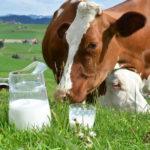The composition and benefits of milk, what and how many vitamins and nutrients it contains
Milk and dairy products appeared in human nutrition more than 7000 years ago. The varied content of vitamins, micro- and macroelements in milk determined its nutritional value. The product is an irreplaceable element of baby food and is successfully used to maintain the health of an adult. It should be borne in mind that the nutritional value of whole milk and pasteurized milk is different.
Chemical composition and nutritional value of the product
Milk is an important food product for adults and children, which is consumed as an independent drink and is used for the preparation of many dishes, baked goods, and confectionery. The nutritional value of cow's milk is determined by its rich chemical composition. 100 g of the product contains:
- the source of 8 essential amino acids is complete proteins (3.2 g). About 20 amino acids are considered valuable;
- fats (3.25 g). Elderly people and people suffering from excess weight are advised to consume a fat-free product;
- carbohydrates (5.2 g) are represented by milk sugar. Lactose is an active participant in calcium metabolism and is also a source of energy. Differs in a high percentage of digestibility (95-99%).
The energy value of milk is determined by its fat content, fluctuates between 52-64 kcal / 100 g.
What are the beneficial substances in milk?
Thanks to modern research methods, a large complex of vitamins, about 50 useful micro and macro elements have been found in milk.
Vitamins
Milk contains a wide variety of vitamins, but some are limited. The group of vitamins can be divided into two types:
- fat-soluble (A, D, E, K). Summer milk contains more vitamin A, the substance can withstand heating to 115-120 ° C, but is destroyed by light and oxygen. Vitamin D is not destroyed during processing;
- B vitamins and ascorbic acid are found in milk in a water-soluble form. An increase in the B2 content from 1.5 mg / kg to 6.8 mg / kg (in hard cheese) in fermented milk products is noted. But vitamin PP is more in whole milk than in fermented milk products. It should be noted that vitamins are not destroyed by heat treatment. There is little vitamin C (1.5 mg / kg), and the substance is destroyed during pasteurization. However, when the liquid is fermented, the content of ascorbic acid increases.

The presence and safety of vitamins is determined by a number of factors: conditions of milk processing and storage, seasonality, breed of cows, diet.
Minerals
Calcium, phosphorus, potassium, magnesium, sodium are among the main trace elements found in milk:
- the greatest value is calcium (113 mg per 100 g of liquid).The amount of calcium depends on the diet of the cow, the season, and the stage of lactation. In the summer, the amount of calcium decreases;
- the potassium content is 143-170 mg per 100 g of milk, slightly changes during the year;
- the amount of magnesium is small (10 mg per 100 g of milk), but the mineral has an effect on the formation of immunity, development and growth of the body.
Milk is also rich in trace elements (copper, cobalt, iodine, silicon, selenium, tin, copper, iron, zinc, fluorine, chromium).
It should be borne in mind that the amount of trace elements depends not only on the diet of the cow and the season, but also on the storage and processing conditions of dairy products.
Beneficial features
The rich vitamin and mineral composition of milk, high protein content explains the benefits of milk. The product is absorbed by the human body well, showing the following positive qualities:
- normalization of the nervous system, human performance;
- calcium is important for the development of bone mass. The daily dose (350 mg) contains 300 ml of the product;
- trace elements contribute to the normal growth and development of muscle mass;
- proteins help lower blood pressure.
The product fits into the diet for those who want to lose weight, since it is low in calories and allows you to preserve muscle mass. Low-fat milk and dairy products help reduce the risk of stroke and coronary heart disease. Glutathione is a powerful antioxidant that protects the immune system and helps fight various diseases.
Low-calorie milk complements a person's daily diet and is an essential ingredient in many meals. Due to the vitamin and mineral complex, the product is added to some therapeutic diets and is included in baby food. Disputes about the benefits and harms do not subside, because sometimes there are cases of intolerance to dairy products.











